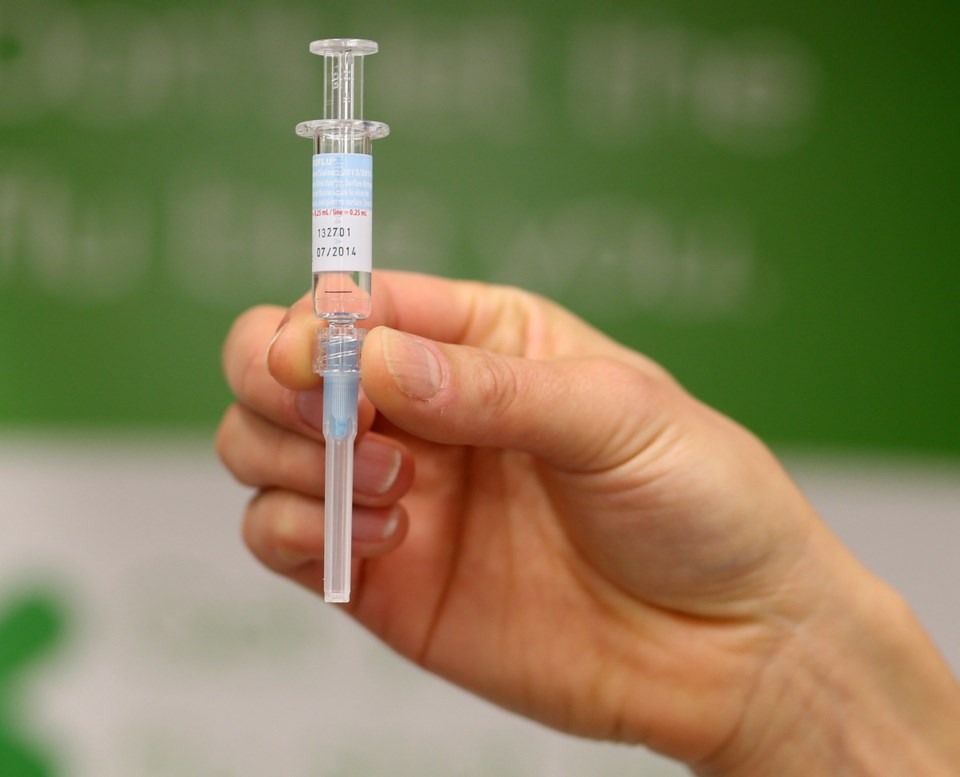People who have not been vaccinated and are visiting or working at a B.C. health- care facility are once again being asked to don masks.
The mask policy goes into effect today, the official start of flu season, and continues until March 31. Flu is usually most prevalent between late December and early January.
The B.C. Health Ministry said each year there are about 3,500 deaths from the flu and its complications in Canada. Provincial health officer Perry Kendall said the flu causes by far the most deaths among vaccine-preventable diseases, outpacing all others combined.
The flu-mask order applies to everyone in hospital, long-term care and assisted-living homes who is not immunized, including health-authority employees, students, physicians, residents, contractors, vendors and volunteers.
The order is enforced through a mix of monitoring and self-reporting. Visitors who have not been vaccinated will be provided a free mask and are expected to comply with the policy on the honour system.
Island Health distributed 227,000 vaccine doses to pharmacists, public health units and physician offices this fall. Last year, 215,106 flu doses were delivered on Vancouver Island, which has a population of about 750,000.
At Island Health, 76 per cent of employees, not including doctors, were vaccinated in the 2014-2015 flu season. The B.C. average for health authorities was 80 per cent.
So far, 54 per cent of Island Health employees have reported having a flu shot, but it’s still early in the season, said Island Health medical health officer Dr. Dee Hoyano. Hoyano said that with the flu-mask policy in place, “we expect the numbers would go up in the next week or two.”
Kendall concedes some people might be dissuaded from being vaccinated because last year’s vaccine was not a good match for the flu strain that hit Canada. The issue was raised by the B.C. Nurses’ Union and others, “but we’ve been communicating [that] we’re anticipating a much better match this year.
“So over a large number of years, the vaccine is effective, but every once in a while, over a decade or so, we get a bad match.”
This year’s flu shot for adults was designed to protect against three strains of influenza virus specified by the World Health Organization: an H1N1-like virus, an H3N2-like virus and a B strain.
The flu shot is so accessible and safe and offers such significant protection against three flu strains that it seems inexplicable not to get vaccinated, Kendall said. “Obviously it doesn’t protect against every respiratory illness, but it’s not intended to. But it seems such a simple thing to do to protect yourself, to help your co-workers by not being ill, and to protect your patients or loved ones.”
Hospitalized patients, seniors in residential care and assisted living, pregnant women and very young children are more vulnerable to the flu than healthy adults, the Health Ministry says.
Those infected with the flu are highly contagious and can spread the virus for a day before the onset of symptoms.
The vaccine is free to those intending to visit a health-care facility and available at public-health clinics, physicians’ offices, travel clinics and pharmacies. It’s also free for kids age six months to five, adults 65 and older, pregnant women and aboriginal people, as well as individuals with chronic health conditions or compromised immune systems and their household contacts and caregivers.
A nasal-spray flu vaccine is free at public-health clinics and physicians’ offices to children two to 17 years old who are at risk of serious illness from influenza or who live with someone who is at risk.



